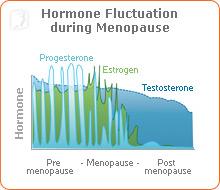Menopause is a natural stage in a woman's life, much like puberty. It is accompanied by a variety of signs and symptoms which can be troublesome. Read on to learn more.
What Is Natural Menopause?

Menopause usually occurs when a woman is between the ages of 45 and 55. The production of reproductive hormones, such as estrogen, testosterone and progesterone, fluctuates throughout this period, leading to an overall decrease in hormone levels. When hormone levels drop to a certain point, ovulation and menstruation cease; menopause occurs when one year after a woman's final period has passed.
What Are the Most Common Menopause Symptoms?
The hormone fluctuations that occur during menopause can cause a variety of symptoms. Some of the most common ones include:
- Hot flashes
- Night sweats
- Mood swings
- Vaginal dryness
- Irregular periods
- Changes in libido
- Weight gain
- Dry skin
- Joint pain
- Bone density loss
- Forgetfulness
- Incontinence
- Irregular heartbeat
- Insomnia
- Anxiety
- Depression
Changes during Menopause
Menopause also brings with is a variety of physical changes in your body. Between decreasing levels of estrogen and relatively high levels of androgen hormone, the body often will redistribute the fat from the hips and thighs to the abdomen area. Some women also find that their skin is dryer, and may find an increase in facial hair even though the rest of their hair is thinning.
Menopause affects women differently, and while some women experience only light symptoms, other women experience severe symptoms, and many are at risk of osteoporosis and heart disease.
Treatments for Menopause Symptoms
There are few treatment methods you can try to help your body adjust to the changes.

- Exercise. 2.5 - 5 hours per week is recommended to help keep the body in good shape and hormones balanced.
- Eat healthy. Make sure you're getting all the vitamins and nutrients necessary to stimulate your hormone glands.
- Sleep. 7-8 hours a night is recommended. Fatigue and sleep deprivation can worsen menopause symptoms.
- Alternative medicines. These include things such as herbal teas and acupuncture. Before diving into these kind of treatments, its important to research them before hand and make sure that there are no adverse side effects, and that they wont react with any of the medications you're currently taking.
If you are ever concerned about your symptoms, talk to your doctor.
Sources
- BMJ Group. "Menopause: What is it?" Patient Leaflet. 2007.
- Hopkins, Virginia. Lee, John R. M.D. What Your Doctor May Not Tell You About Menopause. New York: Warner Books Inc., 1996.
- Love, Susan M.D. Menopause and Hormone Book. New York: Three Rivers Press, 2003.
- Martin, Raquel. The Estrogen Alternative. Rochester, VT: Healing Arts Press, 2000.



